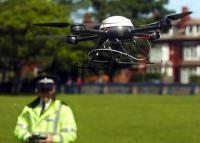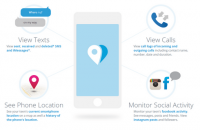-
Yahoo stealthily scanned customer e-mails on behalf of U.S. intelligence agencies

A report on Tuesday accuses Yahoo of secretly building a customized software program to search all of its customers’ incoming e-mails for specific information provided by the U.S. intelligence company. The company, complying with classified NSA and FBI directives, scanned hundreds of millions of Yahoo Mail accounts. Yahoo is the first U.S. Internet company to agree to such a blanket request.
-
-
From 2012 to 2014, FBI submitted 561 Section215 applications: DOJ OIG
The Department of Justice (DOJ) Office of the Inspector General (OIG) last week released a June 2016 report examining the FBI’s use of the investigative authority granted by Section 215 of the Patriot Act between 2012 and 2014. The report notes that from 2012 through 2014 the DOJ, on behalf of the FBI, submitted 561 Section 215 applications to the FISA Court, all of which were approved.
-
-
Feds: We can read all your e-mail, and you’ll never know

Fear of hackers reading private e-mails in cloud-based systems like Microsoft Outlook, Gmail, or Yahoo has recently sent regular people and public officials scrambling to delete entire accounts full of messages dating back years. What we don’t expect is our own government to hack our e-mail — but it’s happening. Federal court cases going on right now are revealing that federal officials can read all your e-mail without your knowledge. For example, in the case of U.S. v. Ravelo, pending in Newark, New Jersey, the government used a search warrant to download the entire contents of a lawyer’s personal cellphone – more than 90,000 items including text messages, e-mails, contact lists, and photos. When the phone’s owner complained to a judge, the government argued it could look at everything (except for privileged lawyer-client communications) before the court even issued a ruling. The judge in Ravelo is expected to issue a preliminary ruling on the feds’ arguments sometime in October. All Americans should be watching carefully to what happens next in these cases – the government may be already watching you without your knowledge.
-
-
Swiss approve broader surveillance powers for the government
A majority of 65.5 percent of Swiss voters have on Sunday approved a new surveillance law, agreeing with the government’s argument that that the country’s security services needed more powers in an increasingly dangerous world. Relative to other European countries, the Swiss police and intelligence agencies have had limited investigative powers. For example, the law which was updated on Sunday had banned phone tapping and e-mail surveillance under any circumstances.
-
-
MI6 to recruit hundreds more staff in response to advances in digital technology,
MI6, the U.K.’s overseas intelligence service, is set to recruit hundreds more digital specialists over the next four years in response to the ever-growing digital threats and challenges posed by advancing digital technology. MI6 employs 2,500 people, and the agency focuses on intelligence-gathering and operations outside the United Kingdom. MI5 is in charge of security within the United Kingdom (James Bond worked for MI6). In a rare public appearance, Alex Younger, the head of MI6, said of terrorism: “regrettably, this is an enduring issue which will certainly be with us, I believe, for our professional lifetime.”
-
-
New forensic method identifies people using human hair proteins
In an important breakthrough for the forensic science community, researchers have developed the first-ever biological identification method that exploits the information encoded in proteins of human hair. The new protein identification technique will offer another tool to law enforcement authorities for crime scene investigations and archaeologists, as the method has been able to detect protein in human hair more than 250 years old.
-
-
Israeli tech company’s spyware turns UAE activist’s iPhone into a self-tracking device
Two University of Toronto researchers have uncovered an iPhone-based attack on Ahmed Mansoor, a prominent United Arab Emirates human rights defender. The attack employed spyware produced by NSO Group — an Israeli technology company founded by former members of Unit 8200, the Israeli military’s electronic surveillance branch – which is sold to government for the purpose of spying on their citizens.
-
-
Many sections of Baltimore are under secret, constant aerial video surveillance by BPD

The Baltimore Police Department has secretly deployed a surveillance system using planes and powerful cameras that can continuously record 30-square-mile sections of the city at once. The technology, which is run by a private company, was originally developed for the Defense Department for use in Iraq. It stores the video footage for an undetermined amount of time, and police can use it to retroactively track any pedestrian or vehicle within the surveillance area.
-
-
Gathering information from smartphones in crime investigations
Researchers are working on a new technique that could aid law enforcement in gathering data from smart phones when investigating crimes. The technique, called RetroScope was developed in the last nine months as a continuation of the team’s work in smart phone memory forensics. The new approach moves the focus from a smart phone’s hard drive, which holds information after the phone is shut down, to the device’s RAM, which is volatile memory.
-
-
Germany to search refugees' phones to establish identity, spot suspicious connections

German interior minister Thomas de Maizière will next week announce a new German anti-terror steps, which, among other things, will require refugees and asylum-seekers arriving in Germany without a passport to surrender their smartphones – and all the passwords and security pin numbers associated with the phones – so German security agencies could check the owners’ social media accounts. The security services in Denmark, Norway, Sweden, and the Netherlands already routinely examine refugees’ mobile phones to establish a refugee’s identity.
-
-
“Liquid fingerprinting” technique identifies unknown liquids instantly
A new company — Validere — will commercialize sensing technology invented at Harvard University that can perform instant, in-field characterization of the chemical make-up and material properties of unknown liquids. Validere aims to develop the licensed technology, called Watermark Ink (W-INK), into a pocket-sized device that could be used by first responders to quickly identify chemical spills, or by officials to verify the fuel grade of gasoline right at the pump.
-
-
Accessing a murder victim’s fingerprint-protected smartphone to help solve a crime
Last month, when the Michigan State University Police Department approached professor Anil Jain to see if he could access a fingerprint-locked deceased man’s smartphone to aid in a police investigation, Jain accepted the scientific challenge. On Monday, 25vJuly, it was mission accomplished – Jain and his team unlocked the phone.
-
-
Swimming, crawling, climbing robot to help in security, search & rescue missions
Researchers have developed the first single actuator wave-like robot (SAW). SAW can climb over obstacles or crawl through unstable terrain like sand, grass, and gravel, reaching a top speed of 22.5 inches. The robot will be useful for traveling through the intestine for imaging and biopsies, and for infiltrating problematic, complex security areas, such as tunnels, destroyed buildings, and pipes.
-
-
Remotely disabling non-cooperative vehicles
As they strive to keep the public safe, one of the key challenges facing European security services is the ability to control and stop, at distance, non-cooperative vehicles posing a threat. However, this ability presents more than a technical challenge. To comply with EU legislation, as well as adhere to ethical concerns, the technology would also have to be safe for the user, the driver (and passengers), as well as members of the public and the material infrastructure of the surrounding environment. In lab bench testing, researchers evaluated signal frequency, waveform, and duration — principally of electromagnetic pulses (EMP) and high power microwaves (HPM) — to determine which could best disrupt the functioning of a vehicle’s electronic components.
-
-
New tool keeps track of violent groups without having to geolocate the tweets
Researchers have developed new sentiment analysis algorithms which can monitor the social network Twitter in search of violent groups. The system analyzes both the messages these individuals share and how their relationships develop. The police and other law enforcement agencies could use the tool to detect critical points, threats, and areas with concentrations of potentially dangerous people.
-
- All
- Regional
- Water
- Biometrics
- Borders/Immig
- Business
- Cybersecurity
- Detection
- Disasters
- Government
- Infrastructure
- International
- Public health
- Public Safety
- Communication interoperabillity
- Emergency services
- Emergency medical services
- Fire
- First response
- IEDs
- Law Enforcement
- Law Enforcement Technology
- Military technology
- Nonlethal weapons
- Nuclear weapons
- Personal protection equipment
- Police
- Notification /alert systems
- Situational awareness
- Weapons systems
- Sci-Tech
- Sector Reports
- Surveillance
- Transportation
Advertising & Marketing: advertise@newswirepubs.com
Editorial: editor@newswirepubs.com
General: info@newswirepubs.com
2010-2011 © News Wire Publications, LLC News Wire Publications, LLC
220 Old Country Road | Suite 200 | Mineola | New York | 11501
Permissions and Policies
Editorial: editor@newswirepubs.com
General: info@newswirepubs.com
2010-2011 © News Wire Publications, LLC News Wire Publications, LLC
220 Old Country Road | Suite 200 | Mineola | New York | 11501
Permissions and Policies
